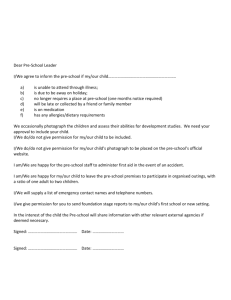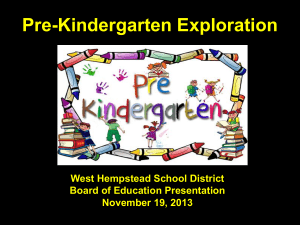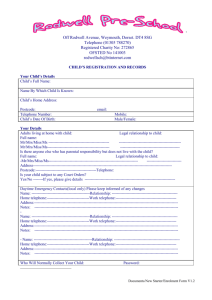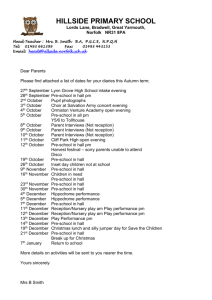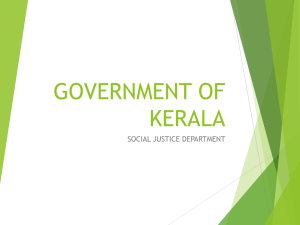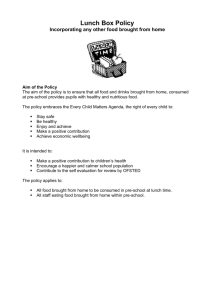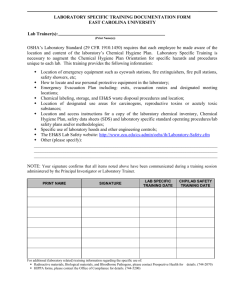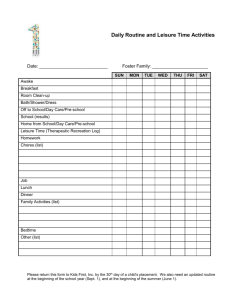5.0 Health and safety
advertisement
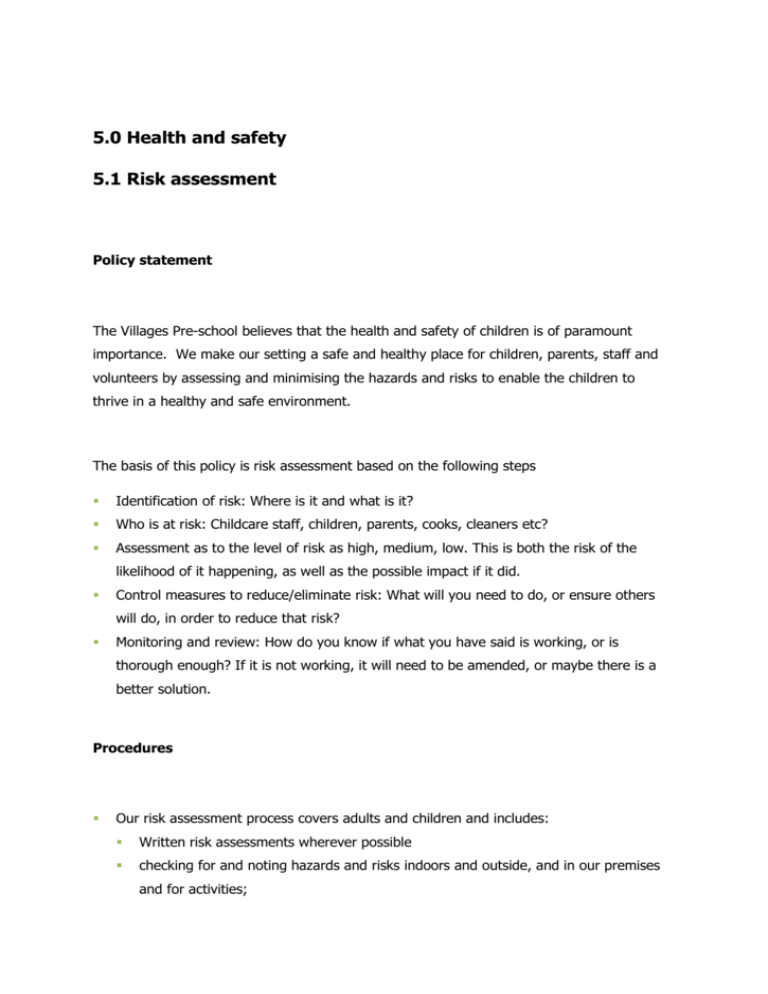
5.0 Health and safety 5.1 Risk assessment Policy statement The Villages Pre-school believes that the health and safety of children is of paramount importance. We make our setting a safe and healthy place for children, parents, staff and volunteers by assessing and minimising the hazards and risks to enable the children to thrive in a healthy and safe environment. The basis of this policy is risk assessment based on the following steps Identification of risk: Where is it and what is it? Who is at risk: Childcare staff, children, parents, cooks, cleaners etc? Assessment as to the level of risk as high, medium, low. This is both the risk of the likelihood of it happening, as well as the possible impact if it did. Control measures to reduce/eliminate risk: What will you need to do, or ensure others will do, in order to reduce that risk? Monitoring and review: How do you know if what you have said is working, or is thorough enough? If it is not working, it will need to be amended, or maybe there is a better solution. Procedures Our risk assessment process covers adults and children and includes: Written risk assessments wherever possible checking for and noting hazards and risks indoors and outside, and in our premises and for activities; assessing the level of risk and who might be affected; deciding which areas need attention; and if required, developing an action plan that specifies the action required, the timescales for action, the person responsible for the action and any funding required. We maintain lists of health and safety issues, which are checked daily before the session. This policy was adopted by The Villages Pre-school Management and staff on 6 September 2013. Date to be reviewed Signed by Manager – Jane Courtney July 2014 (date) 5.0 Health and safety 5.2 Health and safety general standards Policy statement The Villages Pre-school believes that the health and safety of children is of paramount importance. We make our setting a safe and healthy place for children, parents, staff and volunteers. We aim to make children, parents and staff aware of health and safety issues and to minimise the hazards and risks to enable the children to thrive in a healthy and safe environment. Our member of staff responsible for health and safety is Jane Courtney-Mumby She is competent to carry out these responsibilities, has undertaken health and safety training and regularly updates her knowledge and understanding. We display the necessary employment health and safety poster or provide each employee a leaflet containing the key information. Insurance cover We have public liability insurance and employers' liability insurance. The certificate for public liability insurance is displayed in the Entrance area to our setting. Procedures Awareness Raising Our induction training for staff includes a clear explanation of health and safety issues so that all adults are able to adhere to our policy and procedures as they understand their shared responsibility for health and safety. The induction training covers matters of employee well-being, including safe lifting and the storage of potentially dangerous substances. Records are kept of these induction training sessions and new staff are asked to sign the records to confirm that they have taken part. Health and safety issues are explained to the parents of new children so that they understand the part played by these issues in the daily life of the setting. As necessary, health and safety training is included in the annual training plans of staff, and health and safety is discussed regularly at staff meetings. We operate a no smoking policy. Children are made aware of health and safety issues through discussions, planned activities and routines. Safety of adults Adults are provided with guidance about the safe storage, movement, lifting and erection of large pieces of equipment. When adults need to reach up to store equipment or to change light bulbs they are provided with safe equipment to do so. All warning signs are clear and in appropriate languages. Adults do not remain in the building on their own or leave on their own after dark. The sickness of staff and their involvement in accidents is recorded. The records are reviewed termly to identify any issues that need to be addressed. We keep all cleaning chemicals in their original containers. Windows Low level windows are made from materials that prevent accidental breakage or are made safe. Windows above the ground floor are secured so that children cannot climb through them. Doors We take precautions to prevent children's fingers from being trapped in doors. Floors All floor surfaces are checked daily to ensure they are clean and not uneven, wet or damaged. Electrical/gas/fire equipment All electrical/gas equipment conforms to safety requirements and is checked regularly. Our boiler/electrical switch gear/meter cupboard is not accessible to the children. Fires, heaters, electric sockets, wires and leads are properly guarded and the children are taught not to touch them. There are sufficient sockets to prevent overloading. The temperature of hot water is controlled to prevent scalds. A wall-mounted fire blanket is located in the kitchen. Lighting and ventilation is adequate in all areas including storage areas. Storage All resources and materials from which children select are stored safely. All equipment and resources are stored or stacked safely to prevent them accidentally falling or collapsing. Outdoor area Our outdoor area is securely fenced. Our outdoor area is checked for safety and cleared of rubbish before it is used. Adults and children are alerted to the dangers of poisonous plants, herbicides and pesticides. Where water can form a pool on equipment, it is emptied before children start playing outside. Our outdoor sand pit is covered when not in use and is cleaned regularly. All outdoor activities are supervised at all times. Hygiene We regularly seek information from the Health Protection Agency to ensure that we keep up-to-date with the latest recommendations. Our daily routines encourage the children to learn about personal hygiene. We have a schedule for cleaning resources and equipment, dressing-up clothes and furnishings Children are encouraged to shield their mouths when coughing and to wipe runny noses on tissues, then to dispose within the bin. The toilet area has a high standard of hygiene including hand washing and drying facilities and the disposal of nappies. We implement good hygiene practices by: cleaning tables between activities and before snack and mealtimes; cleaning toilets at least daily; wearing protective clothing - such as aprons and disposable gloves - as appropriate; providing sets of clean clothes; providing tissues and wipes Activities and resources Before purchase or loan, equipment and resources are checked to ensure that they are safe for the ages and stages of the children currently attending the setting. The layout of play equipment allows adults and children to move safely and freely between activities. All equipment is regularly checked for cleanliness and safety and any dangerous items are repaired or discarded. All materials, including paint and glue, are non-toxic. Sand is clean and suitable for children's play. Physical play is constantly supervised. Children are taught to handle and store tools safely. Children who may have a nap/sleep during the session are checked regularly. Children learn about health, safety and personal hygiene through the activities we provide and the routines we follow. Any faulty equipment is removed from use and is repaired. If it cannot be repaired it is discarded. Large pieces of equipment are discarded with the consent of the owner/manager. This policy was adopted by The Villages Pre-school Management and staff on 6 September 2013. Date to be reviewed Signed by Manager – Jane Courtney July 2014 (date) 5.0 Health and Safety 5.3 Fire safety and emergency evacuation Policy Statement We ensure our premises present a low risk of fire by ensuring the highest possible standard of fire precautions. The Manager and staff are familiar with the current legal requirements. Where necessary we seek the advice of a competent person, such as a Fire Officer, or Fire Safety Consultant (most recently, sought advice from Richard, Fire Safety Officer, 07881913685). Procedures The basis of fire safety is risk assessment. These are carried out by a ‘competent person’. We ensure that we have a copy of the fire safety risk assessment that applies to the building and we contribute to regular reviews. Fire doors are clearly marked, never obstructed and easily opened from the inside. Smoke detectors/alarms and fire fighting appliances conform to BSEN standards, are fitted in appropriate high risk areas of the building and are checked as specified by the manufacturer. Our emergency evacuation procedures are approved by the Fire Safety Officer and are: clearly displayed in the premises; explained to new members of staff, volunteers and parents; and practised regularly at least each half-term. Records are kept of fire drills and the servicing of fire safety equipment. Emergency evacuation procedure Our evacuation procedure covers procedures for practice drills including: How children are familiar with the sound of the fire alarm. How the children staff and parents know where the fire exits are. How children are led from the building to the assembly point. How they will be accounted for and who by. How long it takes to get the children out safely. Who calls the emergency services and when in the event of a real fire. How parents are contacted. The fire drill record contains: Date and time of the drill. How long it took. Whether there were any problems that delayed evacuation. Any further action taken to improve the drill procedure. This policy was adopted by The Villages Pre-school Management and staff on 6 September 2013. Date to be reviewed Signed by Manager – Jane Courtney July 2014 (date) 5.0 Health and safety 5.4 Recording and reporting of accidents and incidents (Including procedure for reporting to HSE, RIDDOR) Policy Statement We follow the guidelines of the Reporting Injuries, Diseases and Dangerous Occurrences (RIDDOR) for the reporting of accidents and incidents. Procedures Our accident records: are kept safely and accessibly; are accessible to all staff and volunteers, who know how to complete it; and are reviewed at least half termly to identify any potential or actual hazards. Reporting accidents and incidents Ofsted is notified as soon as possible, but at least within 14 days of any instance which involves:o Food poisoning affecting two or more children looked after on our premises o A serious accident or injury to, or serious illness of, a child in our care and the action we take in response; and o The death of a child in our care. Local child protection agencies are informed of any serious accident or injury to a child, or the death of any child, while in our care and we act on any advice given by t hose agencies. Any food poisoning affecting tow or more children or adults on our premises is reported to the local Environmental Health Department. Our insurance provider is notified of any injury requiring treatment by a general practitioner or hospital doctor, or the death of a child in our care or adult whilst on the premises. We meet our legal requirements for the safety of our employees by complying with RIDDOR (the Reporting of Injury, Disease and Dangerous Occurrences Regulations). We report to the Health and Safety Executive: any work-related accident leading to an injury to a child or adult, for which they are taken to hospital; any work-related injury to a member of staff, which results in them being unable to work for seven consecutive days; when a member of staff suffers from a reportable work-related disease or illness; any death, of a child or adult, that occurs in connection with activities relating to our work; and any dangerous occurrences. This may be an event that causes injury or fatalities or an event that does not cause an accident but could have done, such as a gas leak. Any dangerous occurrence is recorded in our incident book. See below. Our incident book We have ready access to telephone numbers for emergency services, including local police. As we rent premises we ensure we have access to the person responsible. We keep an incident book for recording incidents including those that that are reportable to the Health and Safety Executive as above. These incidents include: break in, burglary, theft of personal or the setting's property; an intruder gaining unauthorised access to the premises; fire, flood, gas leak or electrical failure; an attack on member of staff or parent on the premises or nearby; any racist incident involving staff or family on the setting’s premises; a notifiable disease or illness, or an outbreak of food poisoning affecting two or more children looked after on the premises; death of a child or adult, and a terrorist attack, or threat of one. In the incident book we record the date and time of the incident, nature of the event, who was affected, what was done about it - or if it was reported to the police, and if so a crime number. Any follow up, or insurance claim made, is also recorded. In the unlikely event of a terrorist attack we follow the advice of the emergency services with regard to evacuation, medical aid and contacting children's families. Our standard Fire Safety Policy will be followed and staff will take charge of their key children. The incident is recorded when the threat is averted. In the unlikely event of a child dying on the premises, the emergency services are called, and the advice of these services are followed. This policy was adopted by The Villages Pre-school Management and staff on 6 September 2013. Date to be reviewed Signed by Manager – Jane Courtney July 2014 (date) 5.0 Health and safety 5.5 Food hygiene (Including procedure for reporting food poisoning) Policy statement In our setting we provide and/or serve food for children on the following basis: Snacks and Packed lunches. We maintain the highest possible food hygiene standards with regard to the purchase, storage, preparation and serving of food. We are registered as a food provider with the local authority Environmental Health Department. Procedures The person in charge and the person responsible for food preparation understands the principles of Hazard Analysis and Critical Control Point (HACCP). The basis for this is risk assessment as is applies to the purchase, storage, preparation and serving of food to prevent growth of bacteria and food contamination. All staff follow the guidelines of Safer Food Better Business. All staff involved in the preparation and handling of food have received training in food hygiene. The person responsible for food preparation and serving carries out daily opening and closing checks on the kitchen to ensure standards are met consistently. (See Safer Food Better Business.) We use reliable suppliers for the food we purchase. Food is stored at correct temperatures and is checked to ensure it is in-date and not subject to contamination by pests, rodents or mould. Packed lunches are stored in a cool place; un-refrigerated food is served to children within 4 hours of preparation at home. Food preparation areas are cleaned before use as well as after use. There are separate facilities for hand-washing and for washing up. All surfaces are clean and non-porous. All utensils, crockery etc are clean and stored appropriately. Waste food is disposed of daily. Cleaning materials and other dangerous materials are stored out of children's reach. Children do not have unsupervised access to the kitchen. When children take part in cooking activities, they: are supervised at all times; understand the importance of hand washing and simple hygiene rules are kept away from hot surfaces and hot water; and do not have unsupervised access to electrical equipment such as blenders etc. Reporting of food poisoning Food poisoning can occur for a number of reasons; not all cases of sickness or diarrhoea are as a result of food poisoning and not all cases of sickness or diarrhoea are reportable. Where children and/or adults have been diagnosed by a GP or hospital doctor to be suffering from food poisoning and where it seems possible that the source of the outbreak is within the setting, the manager will contact the Environmental Health Department, to report the outbreak and will comply with any investigation. Any confirmed cases of food poisoning affecting two or more children looked after on the premises are notified to Ofsted as soon as reasonably practicable, and always within 14 days of the incident. This policy was adopted by The Villages Pre-school Management and staff on 6 September 2013. Date to be reviewed July 2014 (date) Signed by Manager – Jane Courtney 5.0 Health and safety 5.6 Severe Weather Policy statement It is always our intention to remain open irrespective of weather conditions. However we must ensure that we have a policy in place to deal with circumstances outside the norm and which might have an adverse effect on the safe running of our Pre-School. Circumstances might include flood, snow or heat wave. Possible impacts might be Lack of safe access to the Pre-School. Heating, electricity, gas or water failure. Lack of staff to ensure compliant supervision. Exceptionally high or low temperatures. If we are unable to operate the pre-school for any of these reasons, we will contact parents, carers or emergency contacts provided via telephone or email. In other situations, pre-school will remain open, but alterations may be made to access or use of the setting. Procedures Flood (caused by rain) Due to our location, the pre-school is unlikely to be affected by flooding but if the situation should arise, a risk assessment would be undertaken to ensure the safety and wellbeing of children and staff could be maintained. Flood (caused by burst pipes etc) Flooding outside the building might mean access routes would be altered or the outside play area might be out of bounds until the problem was resolved. Flooding inside discovered before a session starts would be assessed, the building owners contacted, emergency services contacted if necessary and a decision taken on whether alternative but safe arrangements could be made to run the session (e,g. using another room/part of the church building/school). Flooding during a session would be dealt with firstly by evacuating children, staff and others to a safe location (e.g. another part of the building) before following the above procedure. Snow and Ice Heavy snowfall outside normal session times will be monitored and a decision made by the Pre-school Manager as to whether the session should operate as normal. In the event of The Villages Pre-School being closed due to adverse and extreme weather, parents/carers will contacted that morning by 8.15, by text to the main mobile contact number provided on the Child Registration Form. Whilst we make every effort to open our setting, there are times when we judge it unsafe for staff and parents to make the journey to Pre-School. In the event of an emergency for safety reasons such as a gas leak, if this is before the session has started, again, parents/carers will contacted in the same way, as soon as we have identified the safety issue. In some circumstances parents may be asked to keep children at home if possible but a limited service may operate for those who cannot make alternative childcare arrangements. It is likely that we will be closed if East Morton or Eldwick primary schools are closed. Where heavy snowfall occurs during a session a decision will be made by the pre-school manager as to whether the pre-school should close early. This decision will be based on the safety and well being of children, staff and parents and our compliance with statutory requirements. Where it is deemed necessary to close early, the emergency contact list provided for each child will be used. Where snowfall has occurred but the pre-school remains open, precautions will be taken to ensure we are all safe. A path leading to the building will be cleared and gritted and a risk assessment will be carried out on the outdoor play area to ensure it is safe to use. Snow may be cleared and the surface gritted in some areas (e.g. steps) but some snow may be left for play purposes. If we have opened the session and for reasons such as heavy snow, we have serious concerns about the safety of children getting home, or parents reaching us, we may contact you and ask that you collect your child early. At least 2 members of staff will wait with the children until all have been safely collected. Ice poses a particular safety risk in the outdoor area and may render the space unusable. Again a risk assessment will be undertaken to establish the usability of the outdoor area where there is ice on the ground. Heat Wave It is our policy to encourage all parents to apply sun cream to their child/ren before arrival at the session and use a ‘once’ type if they feel this will not irritate their child’s skin and they understand the impact of possible vitamin D deficiency. If a child is staying to the afternoon session we ask that parents put a bottle of sun-cream, labelled with the child’s name, within their bag so staff can re-apply at lunch-time. If this is not available, will reapply sun cream using one we retain within the setting. This policy was adopted by The Villages Pre-school Management and staff on 6 September 2013. Date to be reviewed Signed by Manager – Jane Courtney July 2014 (date)
